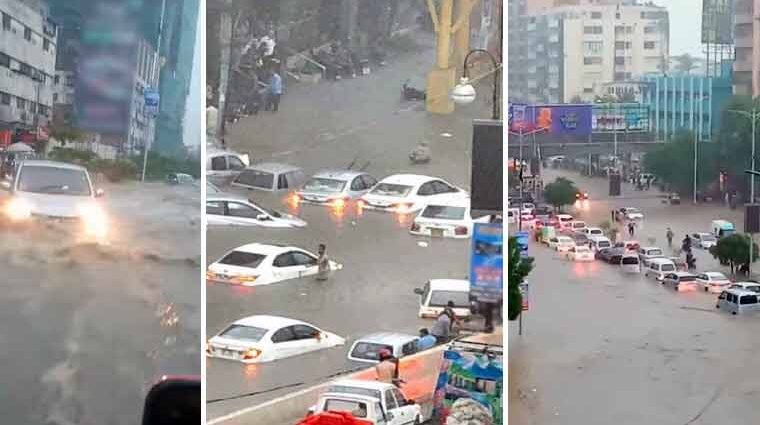First heavy rain of monsoon triggers urban flooding in Karachi
Major roads submerged, businesses shut down & several areas faced power outages
So far five persons killed in wall collapse incidents
ISLAMABAD ( WEB NEWS )
First heavy rain of monsoon triggered urban flooding in Karachi on Tuesday, paralysing the metropolis as major roads were submerged, businesses shut down, and several areas faced power outages.
Authorities have advised people to avoid commuting, as many returning from work and school remain stranded with water rising several feet in areas, including Malir — a situation reminiscent of the devastating 2022 rains.
Intermittent downpours continued to lash Karachi throughout the day, leaving much of the city submerged. Several neighbourhoods, including Gulshan-e-Hadeed, Korangi Crossing, Liaquatabad, Baldia Town, Rafah-e-Aam, and Shah Faisal Colony, reported rainwater entering homes.
In some areas, particularly Malir and North Karachi, water levels rose to around four feet, forcing residents to abandon vehicles and wade through flooded streets.
Traffic came to a grinding halt on key arteries including, Sharea Faisal, University Road, and II Chundrigar Road. Vehicles broke down on waterlogged streets, with long queues seen on Nagan Chowrangi, Hub River Road, and Miran Naka, where commuters remained stuck for hours. The flooding also inundated low-lying neighbourhoods in Surjani Town, North Nazimabad’s Shadman Town, and several areas of District Malir.
Moreover, a wall of a house collapsed in Gulistan-e-Jauhar Block 12, resulting in four casualties and injuring two others, said rescue officials. Meanwhile, another wall collapse in Orangi killed a child — pushing the total tally to five.
As per the Met Office’s statistics, the highest rainfall was recorded at Karachi airport (125mm) followed by Gulistan-e-Jauhar (122mm), Nazimabad (29 millimetres), Gulshan-e-Hadeed (75mm), University Road (59mm), Sharea Faisal (17mm), Gulshan-e-Maymar (11mm), airport (13mm), Korangi (14.6mm), Saadi Town (24mm), Orangi (12.2mm) and Keamari (30mm).
The heavy showers also disrupted flight operations at Jinnah International Airport. At least eight flights were cancelled and 20 others delayed, with several inbound flights diverted to other cities. A Pakistan International Airlines (PIA) flight from Skardu (PK-456) was redirected to an alternate airport, while a Dubai-Karachi flight operated by Flydubai (FZ-335) was diverted to Multan.
PIA also cancelled its Karachi-Quetta flights PK-310 and PK-311, along with Karachi-Islamabad flights PK-308 and PK-309. Two Sukkur-bound flights (PK-536 and PK-537) were also scrapped, while private carriers suspended their scheduled Dubai services. Departures and arrivals from Jeddah, Sharjah, Abu Dhabi, Colombo, Medina, Peshawar, and Toronto faced delays ranging between one to five hours, airport sources confirmed.
According to Met Office, strong monsoon currents from Arabian Sea and Bay of Bengal are continuously penetrating the country, especially the southern parts. Under the influence of these meteorological conditions, widespread rain-wind/thundershower (with scattered heavyfalls at times very heavy) is expected in several Sindh districts, including Karachi, from August 19-22, with occasional gaps.
It is also expected in Mithi, Tharparker, Umer Kot, Mirpurkhas, Hyderabad, Shaheed Benazirabad, Karachi, Thatta, Badin, Sajawal, Tando Allayar, Tando Muhammad Khan, Sanghar, Jamshoro, while at scattered places in Sukkur, Larkana, Khairpur, and Jacobabad.
The PMD added that torrential rains may cause urban flooding in low-lying areas of Sindh, including Karachi.
Furthermore, the downpour also resulted in electricity outages in multiple areas. However, K-Electric (KE) has said that the city was being provided with an uninterrupted power supply from more than 1,770 feeders out of 2,100.
As a precautionary measure, power supply is temporarily suspended in low-lying areas, encroachments, and ditches, said the KE spokesperson, adding that the utility supplier’s staff has been fully mobilised and is present in the field.
In light of the Met Office’s prediction, Sindh Chief Minister Syed Murad Ali Shah chaired an emergency meeting a day earlier to oversee preparations for the monsoon rains expected to impact Karachi and other parts of the province.
The CM put the local governments, administration and traffic police on high alert, and directed them to strengthen coordination to ensure convenience for the people in case of heavy rains.

